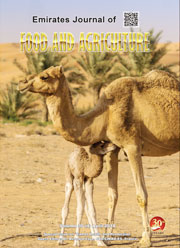Conyza Species in Citrus Orchards and Vineyards of Turkey and Their Management with Glyphosate
DOI:
https://doi.org/10.9755/ejfa.2023.v35.i2.2999Abstract
Conyza species are considered one of the most aggressive weeds in the Aegean and Mediterranean regions of Turkey in terms of their invasive character and their ability to spread to agricultural and nonagricultural areas, including citrus orchards and vineyards. This study was conducted to determine the distribution of Conyza species in citrus orchards and vineyards in these regions and the efficacy of glyphosate when used at different growth stages. The majority of citrus fields and nearly half of the vineyard fields of Turkey were visited in 2015. Due to their similar appearance, the identification of Conyza species at the early stages of growth cannot straightforward; therefore, the species C. canadensis, C. bonariensis, and C. sumatrensis were identified by using PCR and DNA sequence analysis. A total of 252 citrus orchards (131) and vineyards (121) were included in the field survey conducted in the Aegean and Mediterranean regions, and 203 Conyza species were collected. The molecular data revealed that C. bonariensis was the most common Conyza species in nearly half of the citrus orchards, followed by C. canadensis at 33%. C. canadensis was the most dominant Conyza species in more than half of the vineyards, while C. bonariensis and C. sumatrensis were found in 36 and 13 vineyards, respectively. Sequence information of Conyza species was submitted to NCBI with GenBank accession numbers (Conyza (Erigeron) canadensis accession number: OM302550.1, C. bonarensis accession number: OM302551.1, C. sumatrensis accession number: OM302548.1). Glyphosate was more effective when it was applied at the earlier rosette stages for both susceptible and resistant biotypes. Therefore, late treatments could be the main reason for glyphosate having low efficacy against non-resistant populations of Conyza spp.
Keywords: Citrus orchard, DNA sequence analysis, Glyphosate, Horseweed, Vineyard
Downloads
Published
Versions
- 2023-10-19 (3)
- 2023-04-18 (2)
- 2023-02-26 (1)
How to Cite
Issue
Section

This work is licensed under a Creative Commons Attribution-NonCommercial 4.0 International License.










 .
. 